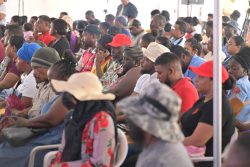A week from today, voters will elect new councils across the country. While turnout tends to be much lighter than for general elections there is a lot at stake here if electors were just to stop and think about their communities and the quality of services being provided.
Coming just shortly after the catastrophic fire at Mahdia that killed 20 children, the Local Government Elections (LGE) also underlines the interplay among the various tiers. Mahdia was declared a town only on October 25, 2018 and took part in its first LGE on November 12 that year. Elections were due again in November or December 2021 but these were significantly delayed for a variety of reasons.
The girls dorm where the tragic fire occurred comes administratively under the sprawling Region Eight (Potaro-Siparuni) council. It has now been learnt that the Region Eight council was advised by the Mahdia fire service in November of last year and February of this year that the grills on the windows of the girls dorm posed a fire hazard. These findings were passed to the Regional Educarion Officer but appeared not to have been acted on. Furthermore, Region Eight Chairman Headley Pio told this newspaper that there had been no discussion of the report, naturally raising questions about the functioning of the Region Eight Council which is elected at the General Elections and which doesn’t have a reporting relationship with the Mahdia Town Council. Shouldn’t the Mahdia Town Council have responsibility for institutions within its precincts such as the dorm rather than the Region Council which presides over a large area with a wide range of needs?
While municipalities are arguably the biggest electoral prizes on June 12, it is the dozens of neighbourhood democratic councils (NDCs) which have the closest contact on a daily basis with the masses. How have they performed since 2018? Little is known about their record in terms of collection of taxes and expenditure of these monies plus government subventions as there is no functional feedback mechanism.
One would have thought that it would have been the responsibility of the Ministry of Local Government and Regional Development to commission performance reviews of the NDCs and for these to be published so that residents within their jurisdictions could assess how they had done and particularly at elections time. However, there is no such role and the Local Government Ministry comes across purely as a politicking arm of the administration rather than an agency whose mandate is to secure consistent improvement in governance by local government bodies.
Anecdotally and based on interactions by this newspaper with NDCs and citizens and letters to the editor, the performance of NDCs in all parts of the country is defined by incompetence, unaccountability and corruption. There are no doubt exceptions to these but few and far in between. The NDCs tend to be dominated by one of the major parties and national politics loom large in their deliberations. There are serious questions about tax collections, decisions on expenditure, the quality of work done and nepotism and self-dealing in the award of contracts. Complaints are unending about the absence of garbage collection, the poor state of roads, decrepit community centres and clogged drains. Serious money is at stake here particularly with the likelihood of increased subventions from the state. More full-time positions have to be available in NDCs for them to function properly but by the same token there must be accountability and members of the public should have full access to NDC meetings.
Following Nomination Day, it was clear that aside from a smattering of independent candidates and groups, the governing PPP/C had pulled out all the stops and was throwing large amounts of resources into its campaign. As the Local Authorities (Elections) Act is silent on how an incumbent should constrain its spending and project commissioning so as not to unfairly influence polls, the PPP/C government has gone all out to capitalise on its advantage. Grand promises have been made to communities, bridges commissioned, roads opened, huge loans signed etc. Some sanity must prevail in these matters.
Campaign financing rules are honoured in the breach and here again the government has no rival. During a visit last month, the head of the European Union Election Observation follow-up mission, Javier Nart made reference to the issue in the context of general elections.
“Financing is critical because controlling of financing, accountability…is very, very important. When a party goes to an election and have no limit with its spending, it is like running with a Ferrari against someone who is on feet. Who is going to win? Of course the Ferrari wins! So, we have to have an equal playing field… so the spending has to have a limit,” Mr Nart reasoned.
He added: “Secondly, the state assets. When you are in power, the possibility of taking public assets for the party, it is something that happens. This is also important”.
With APNU/PNCR appearing at its weakest ever, without inspiring leadership and with stunning defections to the PPP/C, all eyes will be on the results for Georgetown, New Amsterdam, Linden and Bartica in particular. Can the PPP/C with the enormous advantage of incumbency and with money to spread around make significant inroads in either the quantum of votes or the number of seats garnered? Or will the voting pattern remain consistent notwithstanding the blandishments that are on offer?
Hopefully the results will be made available as quickly as possible after the close of polls and there will be none of the trauma that attended the March 2nd 2020 general elections. In preparation for polling day, electors should check the GECOM website to determine where they have to vote and do their civic duty.







